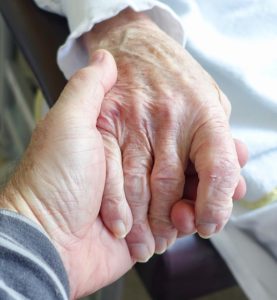It can often be challenging to provide end of life care, with the term itself having final and negative connotations. But what many forget is that it is often the smallest gestures which make the biggest difference.

The thought of caring for someone, either a loved one or in a professional setting, who is nearing the end of their life may be overwhelming. However, while it can be an incredibly difficult time, it can also be very fulfilling. It gives you the opportunity to truly make a positive impact on the lives of others and support them during the time they need it most.
What end of life care involves
End of life care and palliative care works to help people maintain as good a quality of life as possible during the final period of their lives. It takes into account their preferences and wishes and is a holistic approach to care. As well as this, it also focuses on supporting their family and loved ones through the difficult time.
Physical comfort
Depending on their needs, other healthcare professionals may also been involved to help manage the individual’s comfort. Handling problems such as pain, breathing difficulties, fatigue and skin irritation, they can ensure the person is as comfortable as possible.
Emotional support
Mental distress is extremely common as an individual approaches the end of their life. It may include specific concerns such as worrying about the people they are leaving behind or a fear of the unknown.
When trying to comfort them, physical contact can help. Try holding their hand, lightly touch their arm or even a gentle shoulder massage can soothe them and allow them to feel connected.
Spiritual comfort
Many people find comfort in their faith and religion. You could arrange someone from their religious community (a priest, minister, rabbi or imam) to visit to help them pray or read from important texts.
Spiritual needs can also include the desire to resolve past issues with friends or family. If this is not possible then it may be best to seek the advice and assistance of a trained counsellor.
Practical help
The practical aspects of the end of someone’s life can often go unmentioned when discussing the care. Tasks such as paying bills, running errands and even pet care can overwhelm and worry the individual. Helping out with these feature of everyday life can work to relieve this unnecessary anxiety.
When it comes to end of life or palliative services, many assume the only focus is on pain relief or symptom management. While this is incredibly important, there are many other aspects that can make a big difference.
Maintaining communication

For many, the option to be able to still talk to others and have engaging conversations is vital. Keeping the lines of communication open can be as simple as encouraging them to talk about their feelings or bringing up one of their interests.
If in the later stages they are unable to verbally communicate, you may still want to keep talking. Through taking cues from non-verbal forms of communication such as facial expression and body language, you can still provide them with company.
Be there to listen
Similarly, it can be just as beneficial to take a step back and give them someone they can talk to. An eager ear is often all they need as they may wish to discuss their memories, experiences or beliefs. Listening and being present as you spend time together provides them with companionship and the option to vent about any worries they have if necessary.
Help to engage in hobbies and interests
Just because someone is nearing the end of their life does not mean that they suddenly lose all interest in pursuing their hobbies. They may have liked to watch football and so you could tune into a game on the television. If they always read the daily paper, you could pop to the shop each morning and read the main articles out to them.
Through taking the time to get to know the individual you are helping, you can find out all of these interests and start working on ways to allow them to still enjoy them.
Facilitate family visits
Being surrounded by all those they loved can be very comforting. It can bring a sense of fulfilment to not only the person at the end of their life but also their loved ones. Help by organising a space where they can all be together or assisting with travel arrangements.
As with all aspects of care, it is all down to the individual’s preference. No two people are the same and this is reflected in their choices in the later stages of their life, so be prepared to adapt your support in order to fit with these.
